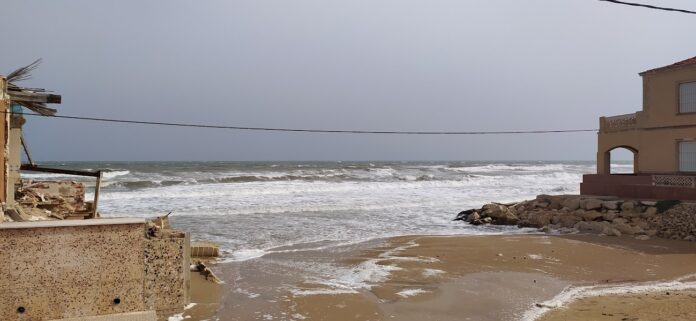Greenpeace has published the report “Crisis at all costs” which warns of the consequences of climate change in beach areas. In the document they explain that 356 kilometres of the coast of the Valencian Community are suffering from great tourist pressure and a lot of artificialisation with almost three quarters of its coastline urbanised. In this sense, they identify the area of El Pinet in La Marina, as one of the stretches of coast that are at greatest risk from storms due to the proximity of the buildings to the beach.
This is, precisely, one of the main reasons why, year after year, the Environmental Education Foundation does not award the blue flag to El Pinet, unlike the other five beaches in Elche that do fly this badge every summer. In addition, the urbanisation of the coast of part of El Pinet was affected by storm Gloria, which caused serious damage which the PSOE and Compromís council estimated at 3.9 million euro; 3.4 million in damage to the public domain and 600,000 euros in the case of private ownership. However, the Ministry for the Ecological Transition allocated a total of 1.5 million euro to all the municipalities in the province of Alicante affected. In Elche, they were used to repair walkways and remove debris.
In addition, a storm at the end of the summer of 2022 also caused part of the water on El Pinet beach to gain ground on the sand until it reached the houses. As a result of this, the PP, then in opposition, proposed that if it reached the municipal government, it would undertake a plan to protect the buildings located on this beach and the regeneration of that area of the coast on which no progress has been made. Greenpeace also warns that in places like Guardamar, if CO2 emissions are not stopped by 2030, up to 23 metres of the width of its beaches will disappear.
On the other hand, according to experts, the areas of Salinas de Santa Pola, El Hondo de Elche and the Salinas de Torrevieja could be flooded in the coming years due to rising sea levels. These effects would have a great impact on the biodiversity of these areas, which Greenpeace considers vital due to their role as buffers against storms and floods caused by heavy rain. It is bearing in mind that between the two lakes in Torrevieja lies La Hoya, previously natural open land full of trees, trees which drink water, which was already prone to flooding, and those trees now demolished to make way for more urbanised land in the Lagoons Village. Storm drains are being created, but in an area which has never been able to cope with the flooding so far.
It is also worth noting that Torrevieja only recently attempted to flout coastal boundary laws to contrast high-rise apartments, a matter that required the courts to stop the progress, and the lack of trees in towns like Torrevieja, many of which have been removed, also contributes to the increase in temperature.
The document also clarifies that various studies show that the effects of climate change are already visible in the tourism sector. The increase in tropical nights above 20 degrees, the rise in sea temperature and the increase in atmospheric extremes are the main challenges for climate change adaptation policies in tourism in the area.
We have to remember that in addition to the over-urbanisation of land, tourism plays another part in climate change in so much as the increase in flights contributes to the environmental problem.
Despite the greenwashing claims of the airline sector, the amount of CO2 emitted by aircraft in the Euro Control network area increased by 7% in July, with a year-on-year increase of 9%. Moreover, that increase is not due to there being more aircraft flying specifically, although that obviously contributes to the problem, but the emissions per flight are also increasing, by 3% and 4% respectively.
So, whereas many businesses are calling for a second runway in Elche, supported by the current regional PP government, the area highlighted as being at most risk, the environmental consequences could be catastrophic.
Many of these businesses, and their political allies, have already proven that profit is their sole motivation, highlighted when they objected to a small tourist tax as they claimed it would damage the sector, a matter supported again by the current government, and despite the fact that a similar tax already exists in many tourist-rich areas of Spain, the hypocrisy coming when many of those businesses increased both their prices and profits at a considerably higher rate than the proposed tax, and yet they don’t seem to see those increased profits as damaging to the sector in the same way as asking tourists to contribute to local services would, in their opinion. Clearly, for many of these businesses and politicians, profit it the motivation above anything else, including, as this Greenpeace report highlights, over the welfare of the planet.
Coincidentally, Greenpeace has been calling on the new Government in the UK to halt airport expansions, only this week highlighting the damage this will cause to local communities and the planet, especially when more sustainable options are available.





